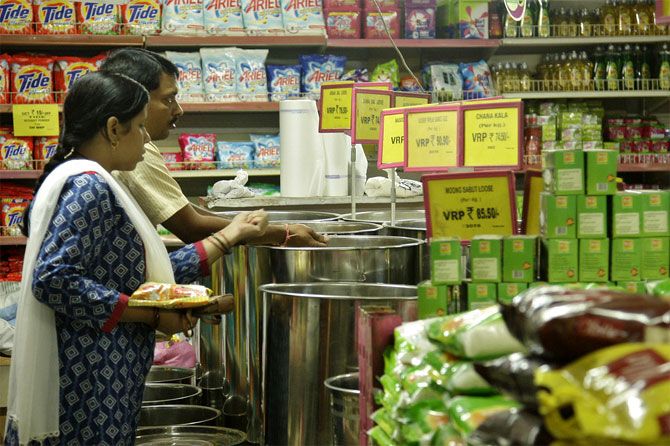While the food and service categories have upheld the CPI sub-components, the sustained decline in WPI-based inflation partly reflected the collapse in international commodity prices.
 As the August monetary policy review approaches, there is a near-unanimity that another interest rate cut is not on the cards.
As the August monetary policy review approaches, there is a near-unanimity that another interest rate cut is not on the cards.
Worries over a weak monsoon, direction of commodity prices, the government's reform measures and external developments will keep the Reserve Bank of India (RBI) cautious.
While the central bank closely watches consumer price index (CPI) trends, there is a renewed debate over whether it is prudent to be solely over-reliant on the most representative inflation indicator, the CPI.
This dilemma stems from the divergence in the CPI-based inflation, wholesale price index (WPI) and gross domestic product (GDP) deflator over the past two-three quarters.
All three indices have eased from last year's levels, with CPI-based inflation bouncing off lows to above five per cent year-on-year (y-o-y) in June.
By contrast, WPI-based inflation has been in negative for eight successive months while the GDP deflator fell to a fresh low at 0.2 per cent y-o-y in the March 2015 quarter (negative on gross value added terms). While the food and service categories have upheld the CPI sub-components, the sustained decline in WPI-based inflation partly reflected the collapse in international commodity prices.
At face value, this implied a cooling off in input prices, which should be positive for manufacturers and corporate profitability.
In reality, corporates are still challenged by sober earnings and stressed balance sheets. Instead, slipping core WPI-based inflation pointed to subdued demand conditions, also backed by historically weak credit growth and declining durables production.
Any potential benefits from low input prices - courtesy of falling commodity prices - have been outrun by weak aggregate demand, and limited the net boost to corporate/manufacturers' profitability.
While headline and core WPI are stuck in a disinflationary phase, the retail measure is inching north.
If input and thereby output prices have indeed fallen, how does one then explain the sticky retail inflation prints?
The root of this divergence, of over 700 basis points, lies yet again in structural rigidities and inefficiencies alluded by the central bank.
RBI has sought the government's support to ease the bottlenecks.
The government's official buy-in into the new policy mandate, which sees CPI-based inflation at centrestage, requires North Block to take responsibility of easing supply-side constraints and lifting growth.
While the rebased growth numbers have at least notionally lifted growth, the reform process has been a slow and incremental process.
At the minimum, achieving price stability would require much needed fiscal restraint. Optimism is not high here given the ongoing unproductive parliamentary session.
This adds another reason why RBI might opt to keep policy tight, as structural deficiencies in the economy wait to be addressed. In sum, notwithstanding the divergences, a shift to an inflation-targeting monetary policy has bound the central bank to ensure price stability, as reflected by the CPI-based inflation trends.
RBI will be keen to preserve households' purchasing power after battling years of high inflation.
Radhika Rao is economist and vice-president (group research) at DBS Bank, Singapore. The views expressed are personal.










